






In a future of near-instantaneous global travel, of abundant provision for the needs of all, a future in which no one living can remember an actual war…a long era of stability threatens to come to an abrupt end.
For known only to a few, the leaders of the great Hives, nations without fixed location, have long conspired to keep the world stable, at the cost of just a little blood. A few secret murders, mathematically planned. So that no faction can ever dominate, and the balance holds. And yet the balance is beginning to give way.
Mycroft Canner, convict, sentenced to wander the globe in service to all, knows more about this conspiracy the than he can ever admit. Carlyle Foster, counselor, sensayer, has secrets as well, and they burden Carlyle beyond description. And both Mycroft and Carlyle are privy to the greatest secret of all: Bridger, the child who can bring inanimate objects to life.
Shot through with astonishing invention, Seven Surrenders (available March 7th) is the next movement in one of the great SF epics of our time. Please enjoy this excerpt.
CHAPTER THE FIRST
Nihil Obstet
Nihil Obstat—“Nothing prevents it”—was the old license-by-fiat which kings and inquisitors pronounced in stifled ages when no printing press could give its inky kiss to paper until Tyrant Church and Tyrant State had loosed censorship’s universal gag. But “nihil obstet” is something else when He appends it to our permissions page, Good Jehovah Mason. “Obstet” it is a prayer, one He made over and over to the many authorities who guard humanity: His Imperial father, the Cousin Chair, the King of Spain, the Sensayers’ Conclave, the far-seeing Censor, Brill’s wise Institute: “Let nothing prevent it.” They feared as much for Him as for themselves, tried to sow doubt in Him, asked Him by His many names: Are You sure You want to do this, J.E.D.D. Mason? Tribune? Porphyrogene? Prince? Tenth Director? Tai-Kun? Xiao Hei Wang? Jed? Jagmohan? Micromegas? Jehovah Epicurus Donatien D’Arouet Mason? Are You sure You want this snarling, wounded Earth to learn so much of You? But Madame D’Arouet, who raised Ἄναξ Jehovah in that strange bash’-out-of-time she cultured in the gold-drenched heart of Paris, also taught Him numbers: one and many, less and more. So, the same grim calculus that compelled Cicero and Seneca to give their lives for bleeding Rome compels Jehovah now to end the desperation-pain of the ten billion who cry for answers, even at the cost of worse pain to those dearest to Him, and Himself. For your sake, reader, He prayed, to one, to many. And for His sake I pray too, to that one Power—absent from our permissions page—Which could still stop us, as It stopped firebrand Apollo. The many mouths of Providence have swallowed up a thousand histories, and could swallow one more. So I pray: Let nothing obstruct this book and the Good it aims at. If there is benevolence in You, strange Creator, nihil obstet.
CHAPTER THE SECOND
Sniper’s Chapter
RESTRICTION: THIS SECTION MUST BE EXCISED BEFORE THIS DOCUMENT MAY BE PUBLISHED OR DISTRIBUTED. PRIVATE ACCESS MAY BE GRANTED BY JUDICIAL ORDER.
RESTRICTION ORDERED BY: The Conclave of Sensayers of the Universal Free Alliance.
REASON: Libelous attribution of criminal acts to a licensed sensayer.
RESTRICTION ORDERED BY: Cousins’ Legal Commission.
REASON: Potential harm to the public peace, potential harm to minors herein discussed.
RESTRICTION ORDERED BY: Ordo Quiritum Imperatorisque Masonicorum.
REASON: Instigation of violence against a Familiaris Regni.
RESTRICTION ORDERED BY: Commissioner General Ektor Carlyle Papadelias.
REASON: Strong evidence that substantial parts of this document are an alteration or forgery with destructive intent.
DURATION OF RESTRICTION: Five years, renewable pending review.
Howdy, fans and foes! This is your very own Sniper. First, let me assure you that I’m alive and well. The fugitive lifestyle suits me fine, my wounds are healed, I have plenty of allies, and I will kill Jehovah Mason for you, that I swear, today, tomorrow, a year from now, however long it takes. They can’t guard the little prince forever. Tyrants and assassins have a great symbiosis. Assassins are always evil and despised (even when our effects are good we’re still a bad means to a good end) until tyrants crop up. Then suddenly assassins are heroes, patriots; suddenly we alone have the power to save the world without a revolution, and the destruction revolutions bring. You admit you need us. But, between tyrants, you forget that assassins will only be here, ready, when you want us if we’ve been here, ready, the whole time. You feel dirty keeping such a weapon in the house, but somebody has to keep one or it won’t be there when the bad wolf comes to huff and puff. My office is no less a pillar of this age than Censor or Anonymous. I serve with no less pride.
Second, I should say I’m only writing this one chapter, and Mycroft will take over again when I’ve had my say. Mycroft went to great lengths to contact me so I could describe this event, which did come next in sequence. I agreed to relate it only on condition that they promise not to touch a word of what I wrote. It’s a privilege I intend to abuse to the utmost, and I’ll have my say about Jehovah Mason before I’m done. But I’ll start first with the part that will make your usual narrator squirm the most: correcting their willful omission and giving you a proper physical description of Mycroft Canner.
Mycroft is average height, shorter because they stoop, and swimming in their oversized uniform, like a statue wrapped in sacking, waiting to be restored. Their hair is curly in that classical Greek way, off-black, closer to a grayish tint than brown, and overgrown around the sides and forehead, as if they imagine so marvelous a creature could hide itself beneath a few stray locks. Modern science has kept their face as fresh at thirty-one as it was at seventeen, when all it took was a glance from Mycroft Canner to make the strongest shudder, but now those devil eyes lock tamely on the floor. They’re brown eyes if you get a look at them, bright brown and antique feeling, like the brown tint which makes old wine richer than new. There’s a scarring on their upper lip where violence has split it once too often, which gives a sense of hidden fangs. But the real prize comes when you strip away their uniform and bare the skin beneath, a tapestry of scars, all shapes, all vintages: the crumpled edges of old cuts and bites, the roughness of burns, strap-sores around the wrists and ankles, the ley lines of surgery, bullet holes round like little kisses, all layered on top of one another like a graffiti wall which tempts you to add your own mark. There’s a story behind every scar, and I’ve spent many lucky hours tracing that skin and asking about each; Mycroft answers about one-third of the time.
The Mycroft you remember from the news was lean, all muscle like a starving scavenger. That hasn’t changed. The wildest stray goes soft after a year of warm laps and petting, but not Mycroft. I don’t believe Mycroft starves themself only as self-punishment. It could be that they don’t want to taint such a body with whatever unhealthy slop Servicers’ patrons tend to offer, but I suspect it’s just that our predator finds common food hard to choke down after what they’ve tasted. Their famous hat (and even I was surprised to learn it came from Dominic Seneschal) is an old cloth newsboy cap, round, brown, more patches than cloth at this point, with a small brim in the front and a sprig of frayed threads on the top where the central button was long since lost. Mycroft lied to you, you know. They said there was no Beggar King to command the Servicers, but the sight of that hat makes the others snap to attention as surely as a crown. It’s not for the crimes that the other Servicers idolize Mycroft, it’s what Mycroft’s done since. Even in Hell they’re stunned to find an angel among them, willing to be as much a guardian as a fallen angel can.
Today’s Mycroft genuinely is as obsequious in person as they are in print, a self-styled slave in this world which has none. But if you sit with them awhile, and talk, and coax, the formality fades, the hunch which hides the still-strong shoulders loosens, the hands begin to splay like claws, and eventually the beast I call True Mycroft pokes its nose above the surface. It’s not a prisoner in there, not fighting to break free, just resting inside Slave Mycroft like a ship in harbor, saving itself for something. Slave Mycroft has only one expression: apology. As for True Mycroft, their expressions are unreadable, or rather you’re wrong if you try to read them, like when the shape of a dog’s face makes it seem to smile or frown where really you’re just projecting human expressions onto an inhuman thing.
Like most of us, I first laid eyes on Mycroft Canner on the news just after the capture, as the police wheeled them past row on row of emergency forces. Mycroft was so serene then, basking in the procession as if that transparent coffin-cage was a triumphal chariot. We’d already heard Mycroft’s reasons for the Mardi killings from the recorded speeches they left beside the later bodies. This was the supreme act of violence of this century, done, not by a government, not a Church, not a tribe, not an army, but by an individual. Ever since villagers first wielded sharpened sticks in their chief’s name, the State had had a monopoly on supreme violence, but the Hive system ended that. Mycroft called their killings a demonstration of a liberty our era had not realized we possessed, proof of history’s progress if seventeen deaths were enough to shock the world; historically, seventeen deaths is a good day. Philosophers had long speculated about Savage Man, whether the conscience is innate or implanted by society, and whether the human mind is actually capable of willing evil for the sake of evil—even the most heinous killers still tend to imagine some goal (revenge, profit, personal pleasure, some mad command). It’s an important question, fundamental really—can we choose actions that purely make the world worse without any perverse perceived benefit?—but we couldn’t discover whether the true Human Beast could exist back when the Beast was like a craftsman in an age of mass-production, negligible beside the infinitely greater evils: Democide and War. There before the cameras Mycroft preached that, in these days of peace when we choose our Hive and values for ourselves, human individuals finally have the chance to be the worst thing in the world, and the right to be proud of our choice if we are not. That was the first time I fell in love with anyone outside my bash’.
It was a month after the arrest that Eureka told me Mycroft Canner wasn’t executed after all. We had to make them ours, that was clear. My crush aside, I always say a killer can smell a killer, and with yours truly on the news every five minutes, Mycroft had surely scented me by now. Eureka tracked Mycroft down among the Servicers, and Ockham paid the visit. It took moments for each to recognize what other was. Laconic Ockham delivered simply, “Come,” which Mycroft matched with an instant, “Yes, Məəəer Saneer,” in Mycroft’s signature vague diction which lets you think they’re saying ‘Member’ but underneath it’s really ‘Master’ leaking out. Lesley and I had spent weeks concocting blackmail enough to collar the beast (and keep them silent, which was Ockham’s concern), and were a little pissed to find our schemes superfluous. We’d sent the trapper after a wolf and caught a fawning puppy; there was no choice but to adopt it. It was supposed to be my puppy, but Thisbe set their sights on it, and when Thisbe stirs even O.S. trembles. I still got Mycroft as a playmate, storyteller, sparring partner, but only Thisbe got them at night, and (as I’ve learned now) never touched them. Just as well; as one learns from the obituaries of the wealthy perverts Mycroft used to prostitute themself to, raising money to help other Servicers, if you sleep with Mycroft Canner you don’t live long (and thanks to reading the first half of this history, I now know to call that phenomenon Saladin).
Enough authorial abuse for now. My kidnapping on March twenty-seventh, that’s what I’m supposed to talk about. It happened at six A.M. by my schedule. I’d just endured a nasty (but deserved) chewing out from my fencing coach (obnoxious but worth putting up with, since it’s so hard to find a coach who won’t fall in love with me). I’d removed my tracker for a shower when an odorless and fast-acting drug knocked me cold.
It’s hard to say when I awoke, since the world I woke to was so like a dream. I couldn’t see; I couldn’t move; I couldn’t speak. I wasn’t bound or gagged. It was my hands, my arms, my legs, they all lay limp, and when I tried to call for help, not only would the sound not rise but even my lips refused to form the words. I could feel, and recognized at once that I was lying in the molded contours of a lifedoll box; I know the shape, since fans often ask me to have myself delivered in the packaging so they can have the pleasure of unwrapping me. My first thought was that I might be one of my dolls come to life (no, at the time I did not know about Bridger’s power to bring toys to life, but my profession made one think hard about these things), but my tongue could move, enough to keep me from choking, and I found the notch on the inside of my top left molar which no doll has, which I had etched there for just such eventualities (I told you, I thought hard about these things). Clearly, then, I was no doll. I was breathing. I could swallow (with difficulty), could blink and move my eyes (though the packaging strap across my eyes was as solid as a blindfold), and I could control my bladder and anus enough to keep from soiling the box. A few other joints did tense slightly as I strained—my jaw, some spots on my belly, one muscle in my neck—so I set to exercising them, to see if I could get my blood pumping a bit and so flush chemicals from my system faster, if chemicals were the cause. With concentration I detected spots of soreness scattered around my body which I guessed were remnants of however this paralysis had been achieved. Fear? I didn’t feel much fear. I thought about trying to induce panic to get my heart rate up, but better to keep myself sharp, and ready.
The first words I heard were muffled, both by the box and by a voice distorter, which left the syllables gritty and robotic. « Now, let’s see this surprise that was worth dragging me out here. » I do not speak French, but I hear it often, and Spanish gives me enough of a start to piece the simple stuff together.
« It might have been dangerous bringing it to Your Holiness’s office. I tried to decorate this place to make you feel at home. »
« It’s perfect. All my favorite posters, and the rug’s so cushy. »
« I am a professional. »
« Mmm. That you are. »
The two paused and, from the sound of it, made out. There were two voices, both veiled by distorters. I’m not going to use names. The police promised (in writing) not to use this testimony as evidence against anyone, but the police aren’t so good with that sort of promise. You know which sensayer was promised Sniper in return for handing over the Cousin Carlyle Foster to a certain Blacklaw. If I omit the names then I maintain reasonable doubt.
« Is this the surprise I hope it is? » Hands made the packaging flex.
« If you’ve guessed, it isn’t a surprise. »
I felt clean air on my chest as the box opened. « Oh! Gorgeous … » Hands explored my chest. « It’s real? The real Sniper? »
« I pay my debts, Your Holiness. » Another handguided the first to test my pulse.
« The real Sniper. That’s really the real Sniper? »
« I’ll give my oath on it, if you doubt. »
« Did you get them to consent? »
« Of course not. I knew you’d want to do that part yourself. » « Mmm. How did you snatch them? Did you take the Canner Device for a spin? » «
« And draw a swarm of Moonmen down upon my head? No, no. Stealth and patience, Your Holiness, stealth and patience. »
Hands lifted my arm, the touch delicate but not gentle. « They’re limp. Are they unconscious? »
« That would be no fun. It’s conscious, just frozen like a doll. It can hear us, and when you unwrap the eyes it’ll be able to see, so make sure your mask stays in place. »
Hands played with my fingers, bending them to test resistance. « How did you do this? »
« The paralysis? A very delicate application of this and that. It’s not my invention; Madame’s had this sort of special request before. It’s not permanent, it needs to be refreshed every few hours, but I can arrange another round if need be. »
« Oh, you’ve outdone yourself! You can have Carlyle! You can have any pawn you want! » The other laughed. « You deserved a prize today. That imaginary friend you identified from the boy’s drawings was just what I needed, trick worked like a charm. »
« That child you asked advice about, you broke them successfully? »
« Am breaking. No need to rush. I’ve three of their little friends hostage, and you wouldn’t believe what treasures are already flocking to the bait. »
« Little friends? I hope you’re not breaking any Black Laws, harming minors? »
« Nothing of the sort. Besides, I’ll hardly need such bait once I have little Carlyle to finish things for me. »
« And God? The common God, I mean, are you making progress? You dropped such taunting hints. »
Another hush for kisses.
« God’s almost mine. »
« How long? »
A chuckle. « Patience is a virtue, Your Holiness. Think of it as a balance for today’s delicious vice. Your doll awaits. »
“Mmm.”Practiced hands gripped me under the arms and eased my torso forward until I flopped forward into an embrace. Some long hair caught in my lips as my face fell against bare skin, and I felt breasts against my chest. “Oops! Careful!” They switched to English to address me, laughing as they adjusted my head so my cheek could rest on their shoulder. “What a fragile thing you are, Sniper, and so light! I always imagined the real thing would be heavier than the dolls.”
« Careful you don’t strain its neck. Actually, better put this neck brace on it. I didn’t want the brace to spoil the effect when you opened the box, but there’s real danger of straining something, like with babies. »
“Well, we can’t have that, can we, Sniper? Can’t have you getting hurt. Come here.” My New Owner (what else can a doll call the one to whom it’s given?) held my head still for the Gift-giver to strap the brace in place. That helped, kept my head centered as my Owner tipped me forward into a cuddle. It was an intense embrace, no awkwardness, no holding back, the kind of hug two people can only achieve after long intimacy, but anyone can give in an instant to a stuffed bear. Amazing. “There, is that better? Now let’s get you out of your box and settled somewhere comfortable.”
« Let me help. » I felt the second person’s hands now, midsized enough to belong to either sex, but fierce as clamps. « On three, ready? One, two, three! »
The two of them carried me a short way, then laid me on soft carpet with my head and shoulders propped against a cushion.
“There.” My Owner laid my hands neatly at my sides. “Much better. Now, let’s get this packaging off so we can see your pretty eyes.”
They picked at the packing strip which protects the doll eyes during shipping, splitting the seal with fingernails which (almost) succeeded in not scratching my skin. Even common lamplight seared after such darkness, and I closed my eyes at once, flinching as much as I had power to flinch.
“Oh!” my Owner cried. “Did the bright light hurt you? Here.” They leaned close enough to veil me with shadow, and restored complete darkness to my left eye with a soft kiss on the eyelid. “Let me make it better.” The kiss moved, one eye, then the other, then down my cheek. “There, that’s better. Now open your eyes. It’s okay.”
Squinting at first, I saw a clean white half mask covering the upper half of a light face, with a wash of black hair behind it, leaking over a bare body which was probably not as beautiful as I remember, but I’m about as objective here as Mycroft is about Bridger. (The whole Bridger thing is true, by the way, their powers, everything, there’s proof. Unlike Mycroft, I won’t let you get away with pretending it’s madness.) The room behind my Owner was a collage of me: posters, portraits, some quite rare, all different costumes, naughty, nice, formal, skimpy, all five sports, all seven Hives, and dominated by the 2442 limited-edition of me slumped shirtless in a chair with puppet joints drawn on my skin and the strings of a marionette holding me half-upright. I’ve always liked people who like that one.
“There. Welcome home, Sniper.”
As they kissed my lips which could not kiss back, I felt, at last, my long-sought, threat-free love. In my years as a professional living doll I can’t count how many times I’ve been brought home by a fan who’d dreamed of a night with the original, but the consummation often fails to meet their expectations. Those who want a doll as a lover tend to be timid, shy of being touched, more comfortable with plastic and make-believe. I’ve made myself as benign as possible: hairless, childlike, not strongly gendered either way, and I always let myself be dressed, be fed, be led, but I still touch back, kiss back by reflex, have the potential to be active. That potential spoils the illusion, like when you know a ba’sib is in earshot in the next room, and the fact distracts you even if they do nothing. As long as I could act, Owners weren’t as safe with me as with my dolls. Bondage doesn’t solve this, makes it worse, actually, since the bonds are just reminders of the power they’re restraining. Here, though, with my power not constrained but gone, my Owner was as comfortable as when you sit naked in an empty house, or sing in the bathroom, so I tasted at last that easy affection which only dolls and dildos had enjoyed before. I could feel how much it was changing me even as it happened, the granting of such a visceral wish rewiring things inside my mind, not just the conscious iceburg tip but down into those black depths that even Brillists barely understand. At the time, Thisbe and Eureka hadn’t told the rest of the bash’ about their “black hole” in Paris or what lurks in it, so I had no way to recognize that this was trickle-down of the same threat. . My Owner didn’t study with Madame D’Arouet, but absorbed through the growling Gift-giver the same techniques, as through some dark umbilical: sniff out the forbidden appetites that people don’t admit they have, and make them so real that afterward the normal world feels dull as black and white. Mycroft showed you how Chair Kosala and the Anonymouscan’t kindle the fire anymore without their ‘he’s and ‘she’s and lace and waistcoats. Mycroft was right to use the word ‘addiction.’
“And now for the real mystery.” My Owner’s hands traced a slow path down my sides toward the second packing strip which protected my most private parts. They glanced over their shoulder at the Gift-giver. « You’ve been waiting for this, haven’t you? »
“Actually, I already saw. » The Gift-giver stood behind my Owner, also masked, and with a black cloak which hid everything but a spot of shadowed throat. “Apologies for not waiting for you, Your Holiness, but I had to towel it off and get it boxed up. It was quite suspenseful, the rumors being so contradictory. »
« I know. » My Owner eased my thighs apart. “You’re a naughty thing, Sniper, spreading confusing rumors to keep us guessing.” I couldn’t look down, but saw a subtle smile as their fingers cracked the seal. (I thought hard about whether to reveal this here, but it’s time. I remain infinitely grateful to everyone who helped me keep the secret this long: the Celebrity Youth Act, my coaches, doctors, teammates, journalists, my many fans who knew, and many more who burned to know but respected my request so much you even rioted outside The Scoop that time they threatened an exposé. But it’s time free you all from that silence, that mystery, to let you see completely what I was, now that my doll days are over.) “A boy,” my Owner announced. “Not surprising. No, wait.” They leaned closer, their long hair tickling my thighs, which could not twitch. “Both! Oh, excellent.” They lifted my penis gingerly and reached past to feel the vaginal folds behind. “You sweet thing, you didn’t want to disappoint fans who got used to either model. How thoughtful!” They spread me further, the room’s air cold against the wetness of my labia. « It’s a beautiful job, seamless!” They turned again to the Gift-giver. « Which sex were they originally, do you know? »
The Gift-giver leaned forward. « I couldn’t tell. Everything down there looks and tastes genuine. I could take some hair to the lab. »
« No need. This is how Sniper should be, now that I think about it. » My Owner withdrew their hands from my penis carefully, as if handling a baby bird. « Oh! It twitched. » They chuckled their delight. “Can they perform? »
« Of course. The paralysis is very selective. It’ll take some massage, but you can get it up if you want. »
« Mmm. Not much massage from the look of it. Somebody’s enjoying themself. » My Owner ran a finger up my cheek. “Aren’t you?”
Knowing no answer would come, my Owner tasted my lips again, and eased me forward, their affection washing over me like a good movie, which takes you to all the peaks of passion without you having to lift a finger. They were used to my body, knew just how my shoulders swing, and at what height to hook my chin over their shoulder.
« How long can I keep them? »
It was a burning question for me, too.
The Gift-giver shrugged. « That’s up to Your Holiness. If you want to keep it permanently I can bring what you’ll need, but it’ll be difficult keeping its Olympic physique from deteriorating in captivity, and there’ll be quite the manhunt. I recommend catch-and-release: you enjoy yourself, then have me return Sniper to the wild and take it again when next you’re in the mood. »
« Would that work? »
« Certainly. I estimate another two hours until the rest of the bash’ realizes Sniper’s missing, but they’ll hunt in secret for at least a day before letting the news get beyond His Grace the Duke. So long as we get Sniper back this evening there won’t be any larger fuss. We can erase its memory as extra security if you like, but I’m sure it won’t breathe a word of this to anyone. If I can do this much to it when I’m calm, it can imagine what I’d do if I were angry. »
My Owner hugged me closer. “There’s no need for threats. My Sniper won’t want to spoil this, not when I’m done. I know what Sniper wants. I’ve known for ages what my Sniper really wants.”
You probably imagine I thought something defiant and heroic here. Some addictions only need one dose.
« Of course, Your Holiness. I apologize for insulting your abilities. »
« Mmm. I’ll have you do some penance for that later. »
« As you wish, Your Holiness. »
My Owner stroked my hair, flicking stray black strands out of my eyes. “Sniper’s turn first, though.”
The computer distortion made the Gift-giver’s chuckle sound like a computer’s dying scream. « Maybe you should keep it permanently. There’s enough nastiness around its bash’, it might be safer here with you. »
« I’ll think about it. »
I thought about it too, realizing that all I could do was lie and wait for my Owner make this decision which would literally determine my entire world, and have a big impact on everybody else’s. Duty was enough to make me wish for freedom, but that was the only moment I can remember that I’ve ever wished the duty wasn’t mine.
The Gift-giver turned to go. « I have work. I’ll be back before the paralysis wears off. I brought some doll clothes for dress-up, they’re in the chest back there. »
« Thanks. »
« Give me a call if you see any twitching. Athletes often have a fast metabolism, so there’s a chance things will wear off faster than normal. »
« Right. »
The Gift-giver came within my line of sight as my Owner shifted me onto their lap. I searched for hints of identity (skin color, weight) beneath the cloak and plaster-white mask, but this foe was too practiced. « Enjoy. »
Enjoy my Owner did, every inch of me, but I’ll skip the details. It was not all sex. A lot of it was being held, that warm, trusting embrace. A lot of it was talk. My Owner talked about what it’s like being able to see people’s hidden obsessions, like having X-ray vision and spotting all the ailments doctors haven’t discovered yet. They talked about the nature of secrets, speculating about why one feels the need to share secrets with someone, whether one imagines something might happen if one says them aloud, like knocking on wood, or whether it just feels more real when there’s a witness. They talked about the state of the world, about ideas of God which I won’t repeat, and a lot about gender. Gender they called a universal language which we’re all supposed to pretend we can’t read. Most just play blind or try (as we know we ought) to eliminate the traces of it, and the ancient inequalities those traces threaten to revive, but, they said, cunning folk can use that language to attack targets with body rhetoric they can’t acknowledge, let alone resist. My Owner used a strongly gendered persona intentionally to make people uncomfortable, just as I used my neuter one to set people at ease. We were two house cats who had both learned again the true purpose of claws and fangs; my Owner had taken to hunting, while I had tried to have myself declawed.Now, having read the first half of Mycroft’s history, I know to blame Madame D’Arouet. Mostly, though, my Owner talked about power.
“I need a break from power, Sniper. It sometimes feels like I’ve been playing the manipulation game forever, and once you’re you can’t stop. I enjoy it, I wouldn’t give it up for anything, but my rival is also very good, and I have to turn everyone around me into a pawn on my side to keep them from becoming a pawn on theirs. I need a break, just once in a while, like this. It’s different with you. You can’t try to use me, and I don’t want to use you even though I could. You’re off-limits to my rival, so I can safely make you off-limits to me, too. I can relax. There’s no power with the two of us like this, just fun. I’m sure you need a break too. It’s a very hard game you play keeping Ganymede in power. It must be exhausting, all the training, and competitions, and stunts to keep voters from thinking about anyone but you and Ganymede. But there’s no spotlight here. With me you can stop performing, and you don’t need to worry about your obligations when there’s absolutely nothing you can do about them. You can relax. Isn’t that what you really want, Sniper? A life where you can finally relax?”
I could have tried to answer somehow, give a long blink, a distinct breath, but that would have spoiled it, undone these hours which truly were the pinnacle of my avocation. There’s a word to chew on, ‘avocation’: a second great occupation that takes you away from your vocation, like a musician sidetracked by acting, a teacher by politics, Thisbe by making movies, or my ba’pa designing dolls, all important tasks but secondary still. I don’t blame the parents who made me and Ockham rivals for O.S. (it made us stronger), but when Lesley entered the picture it was clear there would be a winner and a loser when we grew up, no ties. When the fuss over being a Lifedoll model made me a child star, I saw a second path before me, a surer shot than the fight for bash’ leadership, which was always fifty-fifty. The rest agreed a celebrity in the house would be a good addition to our arsenal, so I worked like a maniac to secure my fame: studying for the press, keeping informed, full of jokes, always the most fun to interview, then finding a sport at which my small body (neither exceptionally strong nor fast) could excel, and working to remain competition-worthy through three Olympiads and counting. I loved my avocation, suffered for it, and I took very seriously the duty of belonging to everyone who loved me. But that still came second, and my bash’ vocation first. I do apologize to all who were in love with what I was. I miss you too, and if you contact my underground and host me for a night I’ll do my best to be your Sniper again, but that comes second. My Hive, all Hives, come first. I am a Humanist because I believe in heroes, that history is driven by those individuals with fire enough to change the world. If you aren’t a Humanist it’s because you think something different. That difference matters. I will not let Jehovah Mason undo the system which (as Mycroft sacrificed so much to prove) gives us the right at last to be proud of what we choose to be. The Hives must be defended. Never before has one tyrant been in a position to truly threaten the whole world, so never in history has my true vocation been so necessary. I will kill Jehovah Mason for you; please accept that as my apology.
I’m over my five-thousand-word limit already. What else should I cram in before I go? The Bridger parts are true. Don’t trust the gendered pronouns Mycroft gives people, they all come from Madame. The coup is happening, don’t let anybody tell you different. As for the resistance, I’m not expecting most of you to volunteer to fight and die, but if you support my side, all it means is that you love your Hive, and that you’ll cheer for us when the deed is done. The First World War was the moment humanity learned to count its casualties in millions, but as a Humanist I must ask, as my bash’ founders asked, which changed the world more, the loss of millions or of that handful who would have been the next generation’s heroes? Wilfred Owen left behind a tiny collection of poems, not enough to even make a book, but still the most upsetting things I’ve ever read; if Owen had lived they might have revolutionized literature, spurred presses and politics away from the guilt-laden bravado which would light war’s fire again, or driven countless readers to suicide. Karl Schwarzschild corresponded with Einstein from the trenches and deduced the existence of black holes while rotting knee-deep in muck; if Schwarzschild had lived they might have accelerated physics by fifty years, enabled Mukta two generations earlier, or given the Nazis nukes. Owen and Schwarzschild; calculate carefully which firebrands to snuff and one death can redirect history better than any battle. That was the foundation of O.S.
Ojiro Cardigan Sniper, Thirteenth O.S., May 23rd, 2454
END OF RESTRICTED SECTION. PUBLIC ACCOUNT RESUMES.
Copyright © 2017 by Ada Palmer
Order Your Copy






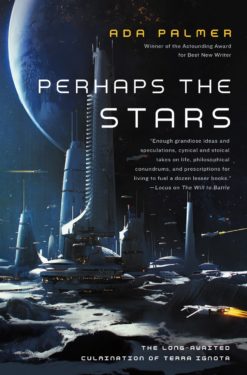 Ada Palmer’s Terra Ignota series is an epic saga of political science fiction, strongly influenced by her background as a historian. As the series draws to a close with the recently released volume, Perhaps the Stars, Ada has taken the time to share her thoughts on how mythos impacts the lives and thoughts of characters, but also people.
Ada Palmer’s Terra Ignota series is an epic saga of political science fiction, strongly influenced by her background as a historian. As the series draws to a close with the recently released volume, Perhaps the Stars, Ada has taken the time to share her thoughts on how mythos impacts the lives and thoughts of characters, but also people.







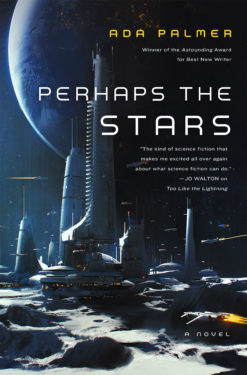
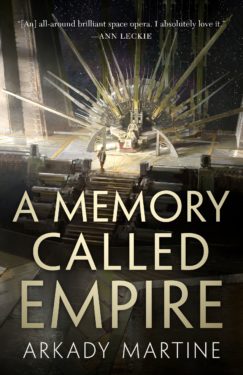 Teixcalaan series
Teixcalaan series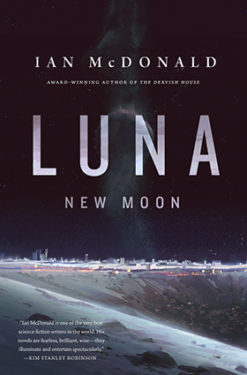 Luna series
Luna series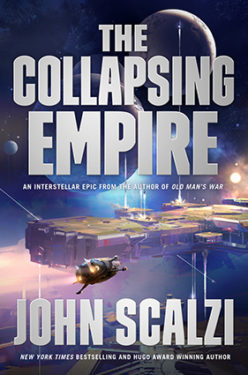
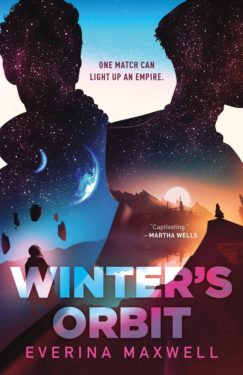 Winter’s Orbit
Winter’s Orbit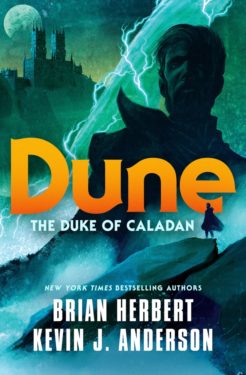 The Caladan Trilogy
The Caladan Trilogy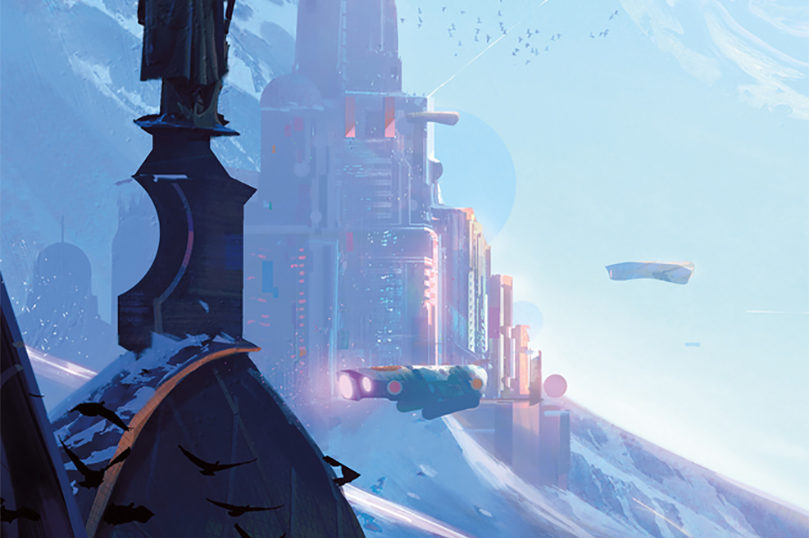
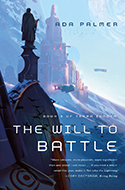
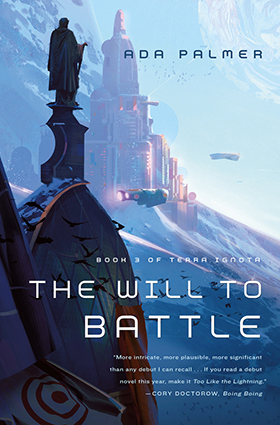

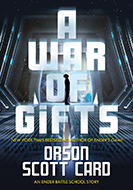
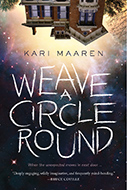
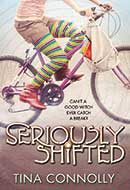
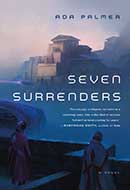
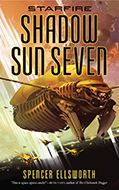
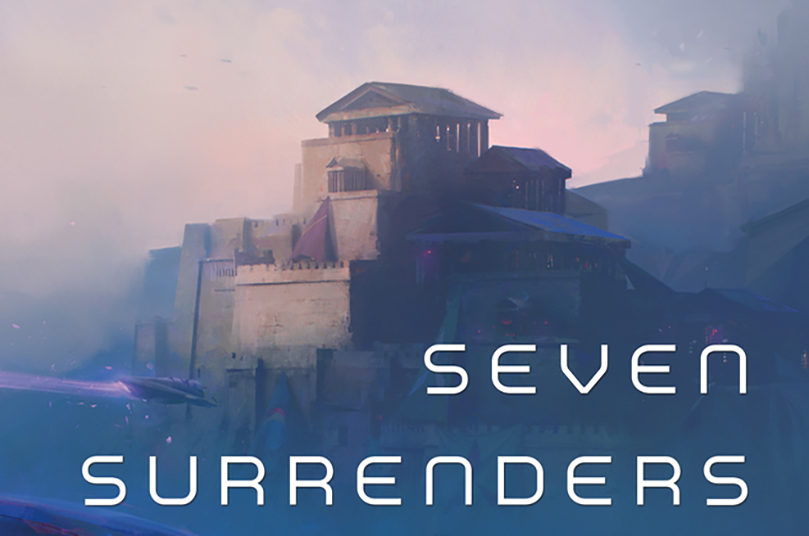


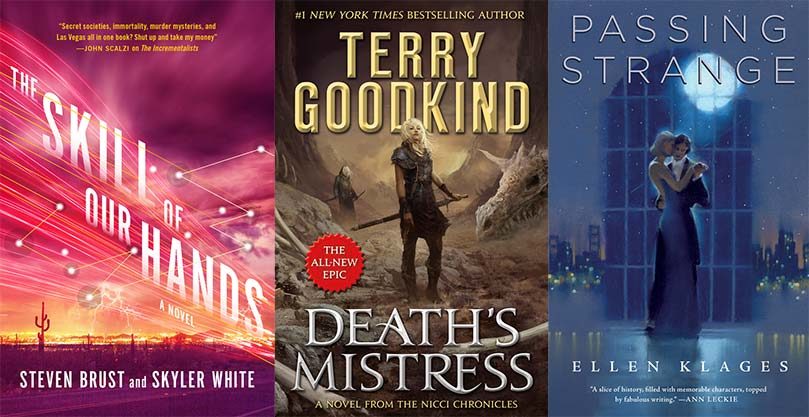









 Two events made September 1st a memorable day for Jesse Cullum. First, he lost a pair of Oakley sunglasses. Second, he saved the life of President Ulysses S. Grant. It’s the near future, and the technology exists to open doorways into the past but not our past, not exactly. Each “past” is effectively an alternate world, identical to ours but only up to the date on which we access it. And a given “past” can only be reached once.
Two events made September 1st a memorable day for Jesse Cullum. First, he lost a pair of Oakley sunglasses. Second, he saved the life of President Ulysses S. Grant. It’s the near future, and the technology exists to open doorways into the past but not our past, not exactly. Each “past” is effectively an alternate world, identical to ours but only up to the date on which we access it. And a given “past” can only be reached once.
